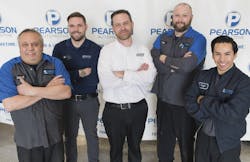Each of Ben Woodfill’s employees is motivated by a hole-in-one. And while, sure, some of them might be fans of an early morning round on the course, the hole-in-one that most of the service manager’s employees are trying to hit is associated with the service center at Pearson Ford in Zionsville, Ind.
He’s installed a board on the shop floor that resembles a golf course and is marked with the benchmarks that each employee needs to hit. If the employee exceeds the benchmark, they get a hole-in-one.
And the person with the best score at the end of the year? Well, he or she receives a green jacket, just like at the Masters Tournament.
It’s all part of the way that Woodfill motivates his employees he’s led over the past year, who work on 11,000 customer pay jobs per year.
“Culture is the No. 1 most important thing in the department,” he says. “I try to concentrate on the employees first and make sure they're making the maximum that they can make.”
A Culture Shift
The results have been fairly dramatic in the fixed ops segments that he oversees. Prior to Woodfill arriving, he says the culture had serious problems.
“They had a bully for a manager the last nine years,” he says. “He constantly beat them down, guilted them, even if they wanted to take a vacation or if they called in sick. He just had a 1984 kind of a vibe about him. And it wasn’t a very solid team.”
“They had a decent foundation. It was trying to break some of the bad habits,” Woodfill adds. “You get into the habit of you’re really busy and you’re herding cattle.”
That’s why establishing the culture was his first order of business upon arriving. He needed to show everyone that they were going to be one unit and if that didn’t work for some people, the department could handle the loss.
He says that he looks at each customer interaction as practice, which is why dissecting each of those interactions, pulling out what went well and, conversely, what didn’t, is crucial. It creates buy-in, he says, and establishes with the team that while mistakes are acceptable, it’s finding the better approach for next time that really matters.
“We’ve lost two technicians and they’re two of the lower producers and with bad attitudes,” he says. “What you’ll find is that when you set the standard of where you want to be, they’ll either figure a way to get out of there or be let go.”
Woodfill didn’t have to fire either of those technicians but he did have to terminate the quick lane manager. While it made an immediate difference in that department, he knew it could easily lead back to square one if he didn’t find the correct leader. In a perhaps surprising choice, Woodfill decided to have a younger advisor on the Ford side with some previous Firestone experience lead the quick lane.
“It just made sense to have him handle the quick lane experience because that’s Ford’s answer to the Firestones,” he says. “So, with the quick lane side of things, a lot of it is back-and-forth communicating. I let him have the reins and do what he needs to do. But I just try to touch on the same things and keep that line of communication open.”
Rebuilding Rapport
One of the most important lessons Woodfill learned from his first years in the industry as a service advisor is simple rapport building. It all comes back to building relationships with people, he says, and that starts with your employees.
"Asking them a little bit about their background is very important,” he says. “Trying to find some common ground with them. Do you have brother and sisters? Get into the family a little bit. Just take more of a personal approach and find that common thing that the two of you share. No matter how difficult people are, we all share similarities. You need to find out what makes them tick.
“You do that just by asking questions, relating to them. If they need some time off, give it to them. You look out for them like you would your own brother or sisters.
“I have three daughters. Some of the ladies I take on become like my daughters and I try to teach them the best way I can. Having a solid relationship with people, being open and honest with people is everything.”
Above all else, Woodfill says the most important part of every single one of his work days is walking around and checking the temperature on the shop floor.
You also need to push each individual in a different way, Woodfill says. Not every employee can be coached in the same way, so it's important to try to customize and teach to each person's needs. At the very least, he says, you need to make sure everyone is in a decent mood.
Breaking Records
In 2017, Pearson Ford broke a 13-year parts and labor sales record that was held before a quick lane existed, a gross record and came within $400 of beating a labor gross goal. How did Woodfill do it? Easy, he says: He simply told his team they would. Of course, it wasn’t that easy, but beating those goals did start with the simple declaration of, “This is what we’re going to do every day.” And from there, he measured what each advisor produced every month and sat down with them to discuss the ways in which they could get to their goal.
“It wasn’t to put pressure on them, but figure out: How are we going to get there?” he says. “Everybody each had their own job and what they were going to do. It was just a daily focus.”
That daily focus included nine different metrics: hours per RO, total customer pay, warranty work, individual sales, brake sales, battery sales, tire and alignment sales, effective labor rate per ticket, and CSI. Looking at that list can seem overwhelming, Woodfill concedes, which is why he decided to present it as a competitive game. He created a board that resembles a golf course with nine different holes.
“Here’s where I want you to be: 800 hours. If you can hit 800 hours, that’s a hole-in-one,” he says. “If Dustin only does 720, they’re going to get a four or five.”
In addition, if the advisors hit the 2.8 or higher hours per RO goal, they receive a $500 bonus. If he or she averages 3.3 hours per RO, he or she receives a hole-in-one. At the end of the year, the advisor with the most wins over the year receives an additional $1,000.
“It keeps pushing them and it holds me accountable as a manager,” he says.
He goes over those goals with all of the advisors on a weekly basis and creates customized goals for each of them based on their experience level. His three veterans, for example, might have an effective labor rate goal of 85 percent and above, and a higher CSI goal.
“We’re measured against the Ford dealers that are in our group,” he says. “When we started our, we were 7th or 8th. Now we’re third. The CSI is the highest it’s ever been at 86.7 percent, 8 points above region. We haven’t looked back. We’re just pushing every month. It’s just about making sure you treat every individual transaction as special and that we’re doing everything we can to make it right for that customer.”
Leveraging Industry Involvement
For Woodfill, remaining on the cutting edge and innovating with his team has become a part of his daily routine. But he didn’t come up with these ideas on his own; instead, they’ve been honed over time and partly thanks to his involvement with Ford’s Service Advisor Panel, which was made up of 23 of the best service advisor from around the country that sat on monthly conference calls and headed to Dearborn, Mich., annually to offer their feedback. At the time, Woodfill was the No. 2 service advisor in his region and a level 4 service advisor (which only 3 percent of Ford service advisors achieve), so Ford reached out to conduct an interview with him and asked to join the panel.
The trips to Dearborn, in particular, were helpful when it came to offering suggestions to Ford and learning from other service advisors.
“They’re looking to extract any information they can from us,” he says. “What are some of the struggles that we have? What can they improve on? Why do you do things this way? We would challenge each other and it was the best experience of my career.”
One of the most lasting changes he was able to make was getting a question changed on the CSI surveys sent out to all customers, on which service advisor pay plans are based. At the time, the question asked if the customer was “completely satisfied” with the experience, which many customers found vague and up for interpretation. Thanks to the group, the question was changed to, “Was your experience excellent?”
Besides being a helpful experience, being on that panel increased Woodfill’s confidence and his capacity to think outside the box.
“I’ve always approached it from a different perspective,” he says.



